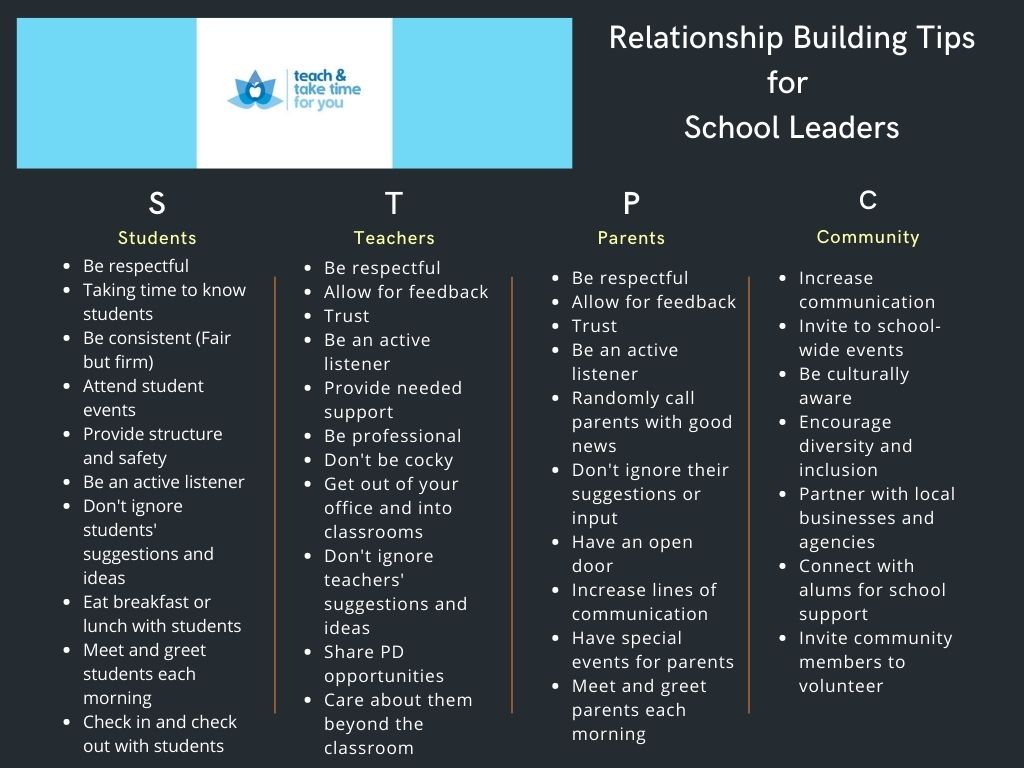Relationship Builders
Relationships are a vital part of our personal and professional lives. School buildings are ecosystems filled with children and adults from various walks of life. All look for positive interactions that help shape their school experiences. Educators are encouraged to foster and facilitate positive teacher-student, parent-teacher, and student-student relationships. Where should they begin? It all starts with the leader. Principals are the lead relationship builders in the school.
The lead relationship builder is a role that every school leader has in their list of responsibilities. Principals are well-known as instructional leaders in their schools. Still, you know they play a variety of roles in the position. As a leader, you will have various connections, associations, links, or bonds with stakeholders of the school ecosystem.
Why are solid and positive relationships meaningful in education? A school often serves as the hub of a community. The building is a safe space for students, parents, and staff. However, it’s not just the physical space of a building that matters; it’s also the human interactions in that space. What goes on among humans in that building is crucial to students’ success. Let’s explore the relationships that affect stakeholders and how the lead relationship builder can support all of them.
Relationship With Students
First, a principal’s relationship with students is most significant. Without students, there would not be a school. Children need positive, trusting, and supportive connections in their lives. We hope that students come to us with solid and positive familial bonds. However, some come from broken homes and families. They arrive in our schools mistrustful and guarded.
The lead relationship builder must model trusting, healing, and supportive interactions for all students. Assure them that it is a safe space for all they physically and emotionally bring. Leaders must learn their names and stories. Talk with students one-to-one and discuss issues that matter to them. Be an active listener and also be firm but fair when needed. Building and maintaining strong “developmental relationships” help connect the principal-student connection.
Developmental relationships between adults and students must include: expressing care, challenging the growth, providing support, sharing power, and expanding possibilities. Educating yourself as a leader and the staff about developmental relationships requires research and professional learning opportunities. For more information about the developmental relationship frameworks, visit the Search Institute.
Principal-Teacher Relationships
Next, the lead relationship builder must focus on the principal-teacher relationships. Sometimes the bond between a principal and teachers can be tenuous. Both have high expectations of the other and must realize it takes both to develop successful students. Teachers want trust, support, and to be seen as professionals. It’s a two-way street for all three items. You earn trust over time through merit and actions. Teachers must work to achieve their principal’s confidence and visa-versa.
School leaders, you must earn their trust, too. Show the teachers that you trust that they are professional and always be professional towards them. Give teachers the space and support to grow as leaders. Allow staff members to be part of the decision-making process. Show support by providing the resources they need to be successful teachers. Appreciate staff members for their hard work and dedication. Allow them to see your humanness and vulnerability.
Principal-Parent Relationships
The principal-parent connection is more significant than most realize. Parents can be your greatest allies or your worst enemies. Parents want what’s best for their children, and they want respect. Being kind and showing your human side invites parents into a comfortable space.
A principal needs to look for opportunities to build cooperative relationships with parents. Leaders who embrace the chances to build relationships with parents will find it a worthwhile investment. Parents may not always agree with your decisions. Their response and support will be different based on your relationship with them. Still, they may better understand your professional choices if the leader-parent connection is strong. Being trustful and respectful may ease the gap when your decision is incorrect.
Community Relationships
A good recipe for a successful school is community involvement. Community members want to have great schools for children to attend. Developing and building a strong relationship with community members, external partners, and agencies is also a priority. Positive connections to the community create success in gaining public support, minimal parent criticisms, and higher student and parent engagement.
Whether urban, suburban, or rural, the school is the hub of the community. Strong community connections can help improve student and staff morale, increase community support, build trust, and increase student engagement. As the lead relationship builder, you must find ways to reach out to and engage residents and businesses in the community. Often many alums of the school still reside nearby. They have memories and pride in being students. That pride is a valuable tool to bring in more support for the students and school.
Principal’s Responsibilities
Principals, leadership is a huge responsibility. The weight is too heavy for many. One way to survive the heaviness is to be the lead relationship builder. By connecting with students, staff, parents, and community members, they can support, lift you and help build a successful school. You must reach your stakeholders and form long-lasting bonds.
Relationship Building Tips

This post contains affiliate links. If you click on a link, a small commission may be paid.

/cdn.vox-cdn.com/uploads/chorus_image/image/62810996/Amm_DeepSentinel_01.0.jpg)

More Stories
TheyDo fires the starting gun on the race to own the customer journey • TechCrunch
How To Develop Buyer Personas: A Crash Course
stocks to buy: 2 top stock recommendations from Aditya Agarwala